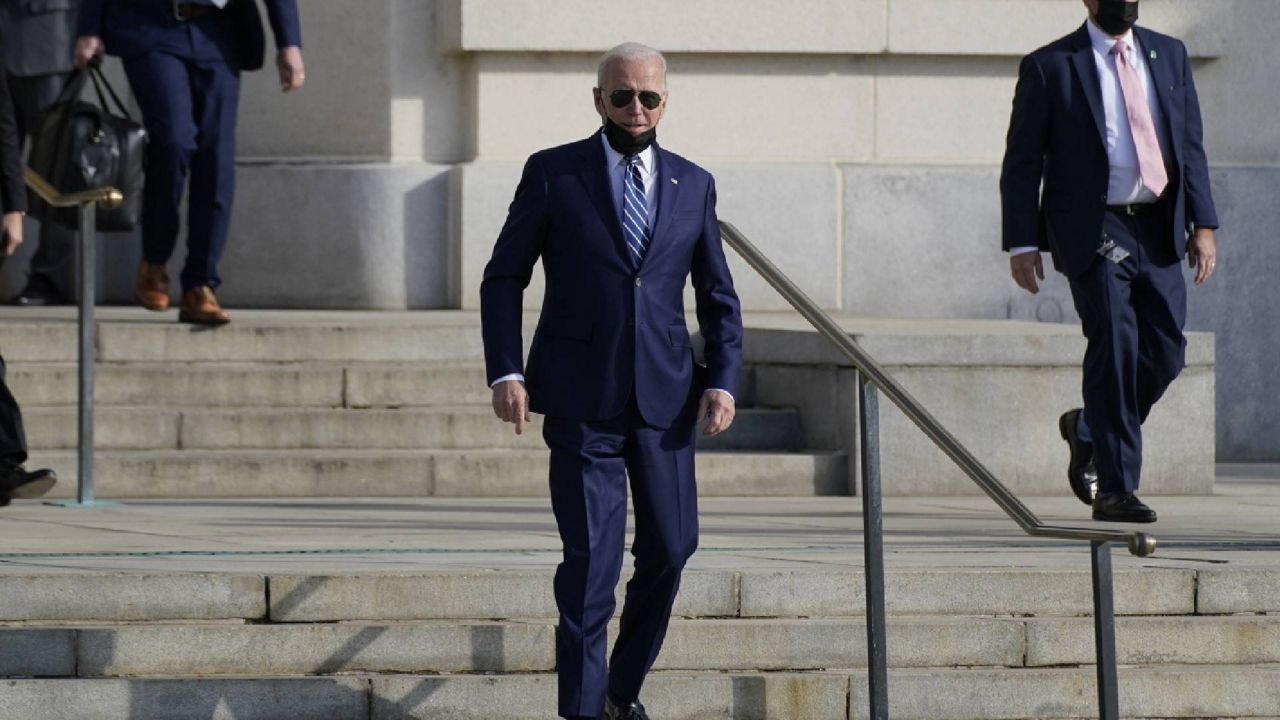President Joe Biden underwent his first physical exam as president at Walter Reed National Military Medical Center on Friday.
As part of the physical, Biden had to undergo a colonoscopy, temporarily transferring power to Vice President Kamala Harris while under anesthesia.
What You Need To Know
- President Joe Biden underwent his first routine physical exam as president at Walter Reed National Military Medical Center on Friday
- As part of the physical, Biden had to undergo a colonoscopy, temporarily transferring power to Vice President Kamala Harris while under anesthesia
- Harris assumed the powers of the presidency for about an hour and 25 minutes, according to the White House
- Harris, who made history as the first female Vice President, was the first woman to hold the powers of the nation's highest office, albeit temporarily
Harris assumed the powers of the presidency for about an hour and 25 minutes, according to the White House. Harris, who made history as the first female Vice President, was the first woman to hold the powers of the nation's highest office, albeit temporarily.
Biden notified House Speaker Nancy Pelosi, D-Calif., and Sen. Patrick Leahy, D-Vt., the president pro tempore of the Senate, that he was invoking section 3 of the 25th Amendment to transfer power to Harris at 10:10 a.m. ET. As of 11:35 a.m. ET, Biden "was in good spirits and at that time resumed his duties," White House press secretary Jen Psaki wrote on Twitter. He returned to the White House around 2:20 p.m. on Friday afternoon.
The White House later released the results of Biden's physical, conducted by Dr. Kevin O'Connor, who has been Biden's primary care physician since 2009.
"President Biden remains a healthy, vigorous, 78-year-old male, who is fit to successfully execute the duties of the president, to include those as Chief Executive, Head of State and Commander in Chief," Dr. O'Connor wrote.
Biden's physician noted two areas of "observation" for the president, including an "increasing frequency and severity of 'throat clearing' and coughing during speaking engagements" and his "ambulatory gait," or an abnormality in walking, which he said is "perceptibly stiffer and less fluid than it was a year or so ago."
Still, Dr. O'Connor said that the president "remains fit for duty, and fully executes all of his responsibilities without any exemptions or accommodations."
Psaki also responded to a recent poll from Politico and Morning Consult in which half of voters disagreed with the statement that the president was "in good health." Psaki said the White House was following "past precedent" with the physical, but added: "There [is] certainly quite a bit of conspiracy theory pushing out there on a range of social media platforms and even through the mouths of elected officials."
Earlier, she explained why the colonoscopy procedure required a transfer of power.
"As was the case when President George W. Bush had the same procedure in 2002 and 2007, and following the process set out in the Constitution, President Biden will transfer power to the Vice President for the brief period of time when he is under anesthesia," Psaki said earlier Friday. "The Vice President will work from her office in the West Wing during this time."
Plans for the physical were announced in an early morning tweet from Psaki.
Biden, who turns 79 Saturday, had his last full exam in December 2019, when doctors found the former vice president to be "healthy, vigorous" and "fit to successfully execute the duties of the Presidency," according to a doctor's report at the time.
Dr. O'Connor wrote in a three-page note that the then-presidential candidate was in overall good shape.
In that report, O’Connor said that since 2003, Biden has had episodes of atrial fibrillation, a type of irregular heartbeat that’s potentially serious but treatable. At the time, O’Connor cited a list of tests that showed Biden’s heart was functioning normally and his only needed care was a blood thinner to prevent the most worrisome risk, blood clots or stroke.
Biden had a brush with death in 1988, requiring surgery to repair two brain aneurysms, weak bulges in arteries, one of them leaking. Biden has never had a recurrence, his doctor said, citing a test in 2014 that examined his arteries.
Biden's predecessor, former President Donald Trump, 75, was sharply criticized for releasing only cursory details on his health while running and serving in the White House, including concealing the seriousness of his COVID-19 illness a month before the 2020 presidential election.
Forty percent of voters surveyed for the Politico/Morning Consult poll released this week agreed with the statement that the president “is in good health,” while 50 percent disagreed.
The Associated Press contributed to this report.



